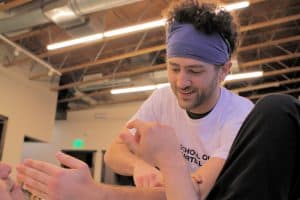In my own Brazilian Jiu Jitsu practice I’ve noticed over the last few years a similar transformation to what I experienced in my Kung Fu and Tai Chi practice earlier on. In the beginning stages, frustration is evident. Grappling with somebody who has much more experience can feel like drowning. Practicing in a gi (traditional uniform) was much more difficult for me because of all the extra grips and ways that my partner could control me. In my previous ground fighting experience, I’d have a T-shirt and pants on. No long sleeves, no thick collar, no belt. I found it very easy to slip out of anything my partners threw at me. Now, with all the extra friction, it’s a completely different story. There was one time that I got stuck under a particularly large partner who was literally smothering me with his belly. I couldn’t breath and found myself panicking. It had been so long that I had experienced that feeling during practice that I was shocked by it.
The frustration that naturally follows gets us nowhere. When we realize this , we make a decision: either we will keep fighting against the process, or we can surrender to it.
Surrendering is one of the most frightening things for human beings. We like to be in control, to feel safe. When we surrender, it feels like we’re giving that up. The truth is, surrender is the ultimate control. It is control over our thoughts and emotions to the point where we transcend them. We give in to what may be possible for us. Higher levels of awareness during Tai Chi and meditation, for example, are only achieved when we fully surrender to the practice and let go of our attachments. We stop worrying about whether or not we are doing things right, or if we look dumb. We stop doubting the technique. We stop doubting ourselves. In that moment, we become impossibly huge. Our experience expands exponentially. We are no longer our small, limited selves.
So, what does this have to do with the red spot?
I could see in the beginning that the students were giving in to frustration. Not that it was all that dramatic, but they started resisting the process as soon as they realized how difficult it would be. Just like in our martial arts practice as a whole, we run into hardship early on. Some people give up and quit after a few weeks or months or even their first class. Others decide, “Not me: I’m going to grit my teeth and gut this out.” If the benefits of martial arts are great enough, and you truly want to learn self defense or get in shape mentally and physically, you’ll put up with that hardship. Yet there is another way.
Kevin found the red spot because he gave in to the process. He surrendered. He knew what he would have to do: spend a few minutes before and after every class looking. Instead of going back and forth in his mind and debating whether or not it was worth it or being concerned with failure, he just got to work.
If we can cultivate this quality in our practice and our lives, things become much more effortless. This is like the zen saying, “strive without striving.” When we surrender to process, we are no longer attached to specific results and getting them right away. Instead, we work the process.
In this way, we are able to break awareness and mindfulness down into workable chunks. Rather than getting overwhelmed by the work that needs to get done and being attached to achieving that state of mind right now, we surrender to the process. We work day after day, class after class, punch by punch and make progress. While this might not seem particularly romantic, it is real. It works.
When I told everybody that somebody had found the red spot, suddenly it became a real possibility for people. Within a day, four more people had found it. Eventually, I revealed that the spot was in the bathroom. All of a sudden, the process wasn’t nearly as daunting and they surrendered to it. Students would walk into the bathroom and find the spot within seconds.
How is this possible? Many people had searched the bathroom before and found nothing. I suggest this is because of the state of mind they were in. Instead of knowing the spot was there, they were caught up in the unlikelihood they would find it. This distracted them from the truth and sapped their awareness and mindfulness. Yet as soon as they knew it was in the bathroom, it became inevitable that they would find it and they did so with ease.
If we can approach practice and other things in life that seem insurmountable in the same way, by surrendering to the process we are shown, that process become effortless.



